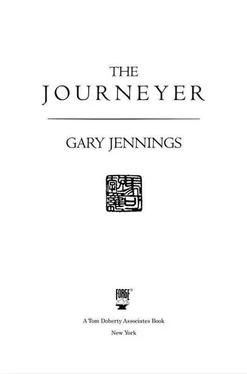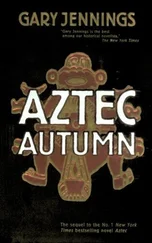“From shallow waters, insignificant fish. We come penniless, marooned, derelict. We are castaways washed up on your doorstep. But we will talk of that later. Here, you have never yet met your namesake nephew.”
“Neodo Marco! Arcistupendonazzìsimo!” So I got a hearty embrace too, and a benvegnùo, and my back pounded. “But our tonazzo Tato Mafio, usually so loud. Why so silent?”
“He has been ill,” said my father. “We will also talk of that. But come! For two months we have been eating nothing but anchovies, and—”
“And they have given you a powerful thirst! Say no more!” He turned to his clerks and bellowed for them to go home, and not to come in to work the next day. They all stood and gave us a rousing cheer—whether for our safe return or for their getting an unexpected holiday, I do not know—and we went out again into the fog.
Uncle Marco took us to his villa on the Marmara seaside, where we spent our first night, and the subsequent week or more, in swilling down good wines and rich viands—none of which was fish—and being bathed and scrubbed and rubbed in my uncle’s private hammam—here called a humoun—and sleeping long hours in luxurious beds, and being waited on, hand and foot, by his numerous house servants. Meanwhile, Uncle Marco sent a special courier vessel hastening to Venice to apprise Dona Fiordelisa of our safe arrival here.
When I felt rested and well-fed enough, and looked and smelled presentable, I was introduced to Uncle Marco’s son and daughter, Nicolò and Maroca. They were both about my own age, but Cousin Maroca was still a spinster, and kept giving me looks half speculative, half suggestive. I was not interested in responding; I was much more interested in sitting with my father and Uncle Marco as we bent our attention on the books of the Compagnia Polo. They quickly reassured us that we were anything but penniless. We were more than respectably wealthy.
Some of the shipments of goods and valuables my father had entrusted to the Mongol horse post had failed to make it the whole way along the Silk Road, but that was only to have been expected; what was more remarkable was that so many had got through to Constantinople. And here Uncle Marco had variously banked and invested and traded most shrewdly with those goods, and by his advice Dona Fiordelisa in Venice had been able to do the same. So by now our Compagnia Polo ranked with the mercantile houses of Spinola of Genoa and Carrara of Padua and Dandolo of Venice as a prima di tuto in the world of commerce. I was especially pleased that, among the consignments which had arrived intact, were those which had contained all the maps my father and Uncle Mafìo and I had made, and all the notes I had jotted down in all those years. Since the Shoe Brigand at Tunceli had not relieved me of my journal notes scribbled since leaving Khanbalik, I now possessed at least a fragmentary record of every one of my journeys.
We stayed on at the villa until spring, so I had time to get well acquainted with Constantinople. And that made for an easy transition between our long sojourn in the East and our return to the West, for Constantinople itself was a blend of both those ends of the earth. It was Eastern of architecture and bazàr markets and variegated races and complexions and costumes and languages and such. But its guazzabuglio of nationalities included some twenty thousand Venetians, about a tenth as many as in Venice itself, and the city had many other similarities to Venice—including its being overrun with cats. Most of the Venetians resided and did business in the Phanar quarter of the city allotted to them, and across the Golden Horn, in the so-called New City, about an equal number of Genoans occupied the Galata quarter.
The exigencies of commerce necessitated daily transactions between Venetians and Genoans. Nothing would ever stop them doing business. But they did their mutual dealings very coolly, at arm’s length, so to speak, and were not mingling sociably or friendlily, because back home —as so often before—their native republics were again at war. I mention that because I was later to have some minor involvement in it. But I will not describe all the aspects of Constantinople, or dwell on our stay there, for it was really only a recuperative and resting place in our journey, and our hearts were already in Venice, and we were eager to follow them there.
So it was that, on a blue and gold May morning, twenty-four years after we had left La Città Serenissima, our galeazza tied up at the dock of our company warehouse, and my father and Uncle Mafìo and I walked down the plank and stepped again upon the cobblestones of the Riva Ca’ de Dio, in the Year of Our Lord one thousand two hundred ninety-five, or, as it would have been counted in Kithai, the Year of the Ram, three thousand nine hundred ninety-three.
5
THE story of the Prodigal Son notwithstanding, I maintain that there is nothing like coming home successful to make the homecoming warm and tumultuous and welcoming. Of course, Dona Fiordelisa would have welcomed us happily, however we had arrived. But if we had slunk into Venice the way we had done at Constantinople, I wager we would have been contemptuously received by our merchant confratelli and the citizenry at large, and they would have cared nothing for the greater fact that we had made such journeys and seen such things as none other of them had ever done. However, since we did come home rich and well-dressed and walking tall, we were greeted like champions, like victors, like heroes.
For weeks after our arrival, there came so many people calling at the Ca’ Polo that we hardly had time of our own to get reacquainted with Dona Lisa and other relatives and friends and neighbors, or to catch up on family news, or to learn the names of all our new servants and slaves and company workers. The old maggiordomo Attilio had died during our absence, and the old chief clerk Isidoro Priuli—and also our aged parish priest, Pare Nunziata—while other house servants, slaves and working men had departed our employ or been dismissed or been freed or been sold, and we had to meet and get to know their successors.
The converging crowds of visitors included some whom we knew from years past, but many others were total strangers. Some came just to fawn on us newly rich arrichisti and seek some advantage from us, the men bringing schemes and projects and soliciting our investment, the women bringing nubile daughters to present for my delectation. Others came with the obvious and venal hope of prying from us information and maps and advice that would enable them to emulate us. Some few came to say sincere congratulations on our safe return, many came to ask inane questions like, “How does it feel to be back?”
To me, at least, it felt good. It was good to walk about the dear old city and glory in the perpetually changing, lapping, liquid mirror light of Venice, so different from the infernal blaze of deserts and the harsh glare of mountain heights and the abrupt white sun and black shade of Eastern bazàrs. It was good to stroll through the piazza and hear all about me the softly inflected cantilena speech of Venice, so different from the rapid jabber of Eastern throngs. It was good to see that Venice was much as I had remembered it. The piazza campanile had been built somewhat taller, some few old buildings had been torn down and new ones put in their places, the interior of San Marco had been adorned with many new mosaics. But nothing was jarringly changed, and that was good.
And still the callers kept coming to the Ca’ Polo. Some of them were agreeable to receive, some were nuisances, some were crass annoyances, and one of them, a fellow merchant, came to cast a pall on our homecoming. He told us, “Word has just arrived from the East, by way of my factor in Cyprus. The Great Khan is dead.” When we pressed for details, we determined that the Khakhan must have died about the time we were making our way through Kurdistan. Well, it was saddening news, but not unexpected: he had been then seventy-eight years old, and simply had succumbed to the ravages of time. Some while later, we got further news: that his death had not precipitated any wars of succession; his grandson Temur had without opposition been elevated to the throne.
Читать дальше












